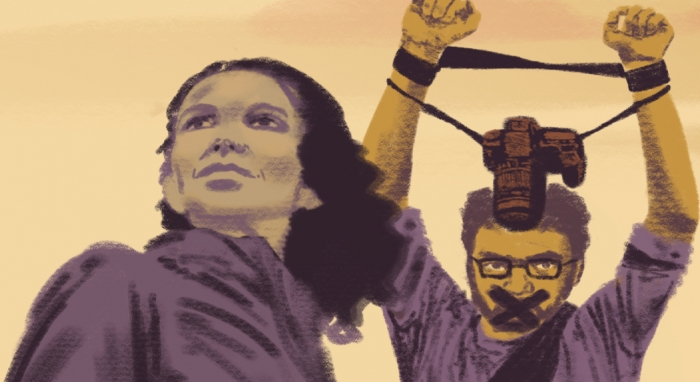
Iran: Human Rights Council must convene a special session
Fifty organisations urge the UN Human Rights Council to urgently convene a special session to address an unprecedented escalation in mass unlawful killings of protesters in Iran.
Photo: Tercer Piso

At the 43rd session of the UN Human Rights Council, Egypt presented its responses to the recommendations of the 2019 Universal Periodic Review. Read here ISHR’s analysis of the responses to recommendations on defenders and civic space.
The government of Egypt refused to acknowledge the systematic and widespread attacks and restrictions against human rights defenders, and to receive visits by Special Rapporteurs on torture and human rights defenders.[1]
While the Egyptian government accepted several recommendations on ensuring a safe and enabling environment for defenders and protecting civic space[2], it rejected all recommendations calling for the government to:
The government of Egypt claimed these recommendations were ‘factually incorrect’ as no one is detained for exercising their rights and all laws have been amended to respect rights such as the NGO law. This despite the fact that the UN Working Group on Arbitrary Detention found that arbitrary detention is a systematic problem in Egypt and could constitute a crime against humanity. ISHR recalls that the new NGO law only replaced prison sentences with hefty fines and defenders are still prosecuted under different laws (such as Article 78 of the Penal Code on foreign funding). Defenders facing trial in case no. 173/2011 could face up to 25 years imprisonment.
The Egyptian government considered other recommendations on human rights defenders as ‘already implemented’ such as:
The Egyptian government claimed that these were implemented as rights of freedom of expression, opinion, assembly and association are guaranteed, and the Prosecution swiftly investigates and punishes any acts of intimidation and reprisals. ISHR recalls that the Prosecution has not investigated any of the reprisals documented by the UN Secretary-General in all his annual reports since 2017, at least. Furthermore, seven UN experts have expressed concern about the collective and corrosive effects of Egypt’s counter-terrorism laws and practices on the promotion and protection of human rights.
The government accepted all recommendations[3] on protecting human rights defenders from reprisals for engaging with the UN. The Egyptian delegation expressed its commitment to guarantee the safety of everyone to engage with the UN and to receive six Special Procedures visits.
By contrast, ISHR recalls that the Special Procedures are ringing the alarm bell regarding the pattern of acts of intimidation and reprisals against individuals and groups who sought to or engaged with the UN. In October 2019, they expressed concern regarding the detention of an Egyptian defender in retaliation for his engagement with the UPR. In November 2019, the Special Procedures called for the release of defender Ibrahim Metwally who has been detained for over two years since his arrest from Cairo airport en route to Geneva to meet with the Working Group on Enforced Disappearances. In December 2019, in response to another reprisals case, they reiterated their concerns that ‘counter-terrorism legislation is being used in Egypt to target human rights defenders with the purpose of quashing their advocacy and suppressing any expression of dissent.’ Following the reprisals against those who cooperated with the Special Rapporteur on adequate housing during her visit to Egypt in 2018, two mandate holders said ‘unless Egypt ensures that human rights defenders and victims of human rights violations can interact with UN human rights envoys without fear of reprisal, it is in our view not ready to host further visits’. No visits have taken place since.
The government refused to acknowledge the practice of torture and ill-treatment in detention centres.[4] It however accepted to publish the measures they have taken to implement the recommendations by the UN Committee against Torture’s 2017 confidential inquiry.[5] ISHR welcomed this step and urged the government to report swiftly to the Council on the measures taken in this regard.
Watch the statement here (Arabic version):
Read here the full joint statement by ISHR and the Egyptian Front for Human Rights delivered during the UPR adoption on 12 March 2020.
[1] Recommendation by Norway.
[2] Recommendations by: Afghanistan, Argentina, Austria, Canada, Ecuador, Estonia, Finland, France, Iceland, Italy, Switzerland, Spain, Peru, Norway, Republic of Korea, New Zealand, Seychelles, United States of America.
[3] Recommendations by Denmark, Ghana, Fiji and Liechtenstein
[4] Recommendations by Slovenia and Costa Rica.
[5] Recommendations by Liechtenstein and the United Kingdom.

Fifty organisations urge the UN Human Rights Council to urgently convene a special session to address an unprecedented escalation in mass unlawful killings of protesters in Iran.

In a landmark ruling against Burundi, the UN Committee against Torture has set a precedent on the protection of lawyers and human rights defenders engaging with UN mechanisms, affirming that reprisals for cooperating with the UN violate the Convention Against Torture.

Are you a human rights defender working on democratic backsliding and/or racial justice, keen to use the UN to push for change at home? If so, apply for the 2026 edition of ISHR’s flagship training, the Human Rights Defender Advocacy Programme (HRDAP)!